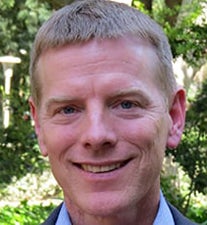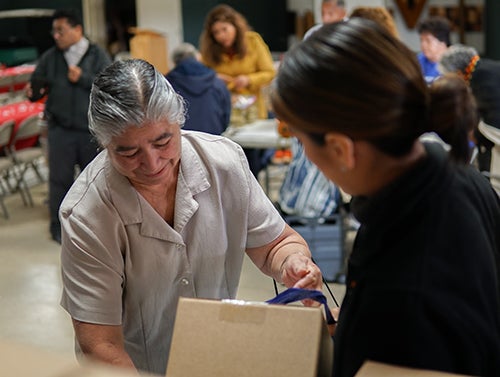
UCR environmental economist Kurt Schwabe has been elected chair of the board of directors for Feeding America Riverside | San Bernardino, or FARSB, the Inland Empire’s largest hunger-relief organization.
Schwabe, a professor of environmental economics and policy in UCR’s School of Public Policy, assumed the chair’s position after serving three years as a regular member of the panel.
Schwabe brings decades of research and leadership experience to the organization. His scholarship focuses on issues central to food and water sustainability, including agricultural production, water affordability, and environmental policy—topics aligned with FARSB’s mission to alleviate hunger and improve access to nutritious food.
“It’s an honor to contribute to an organization that’s making a tangible difference in the lives of so many,” Schwabe said. “As a public policy professor, I understand how structural inequities can drive food insecurity, and I look forward to continuing the excellent work that the board and staff have been focusing on to further develop effective strategies that address these root causes."
Founded in 1980, FARSB is one 200 food banks affiliated with Feeding America’s national food bank network. It distributes as much as 3.1 million pounds of food monthly, serving more than 300,000 people in Riverside and San Bernardino counties, according to FARSB’s website.
Board members provide oversight, assist with fundraising, and support the nonprofit’s strategic goals through regular participation and community engagement. Board qualifications emphasize lived experience, leadership in areas such as public policy or community outreach, and a commitment to inclusiveness.

Schwabe’s academic record meets those qualifications. In addition to his faculty role, he is an adjunct policy fellow at the Public Policy Institute of California’s Water Policy Center. He recently served as the 2023-24 Fulbright Distinguished Chair Fellow of Science, Innovation, and Technology in Australia, and has co-edited two books on water economics. A first-generation college student, Schwabe also brings personal perspective to systemic challenges faced by underserved communities.
His election adds a strong voice for evidence-based solutions to the FARSB board as it works to dismantle barriers to food access in a region where as many as 530,000 people are food insecure.